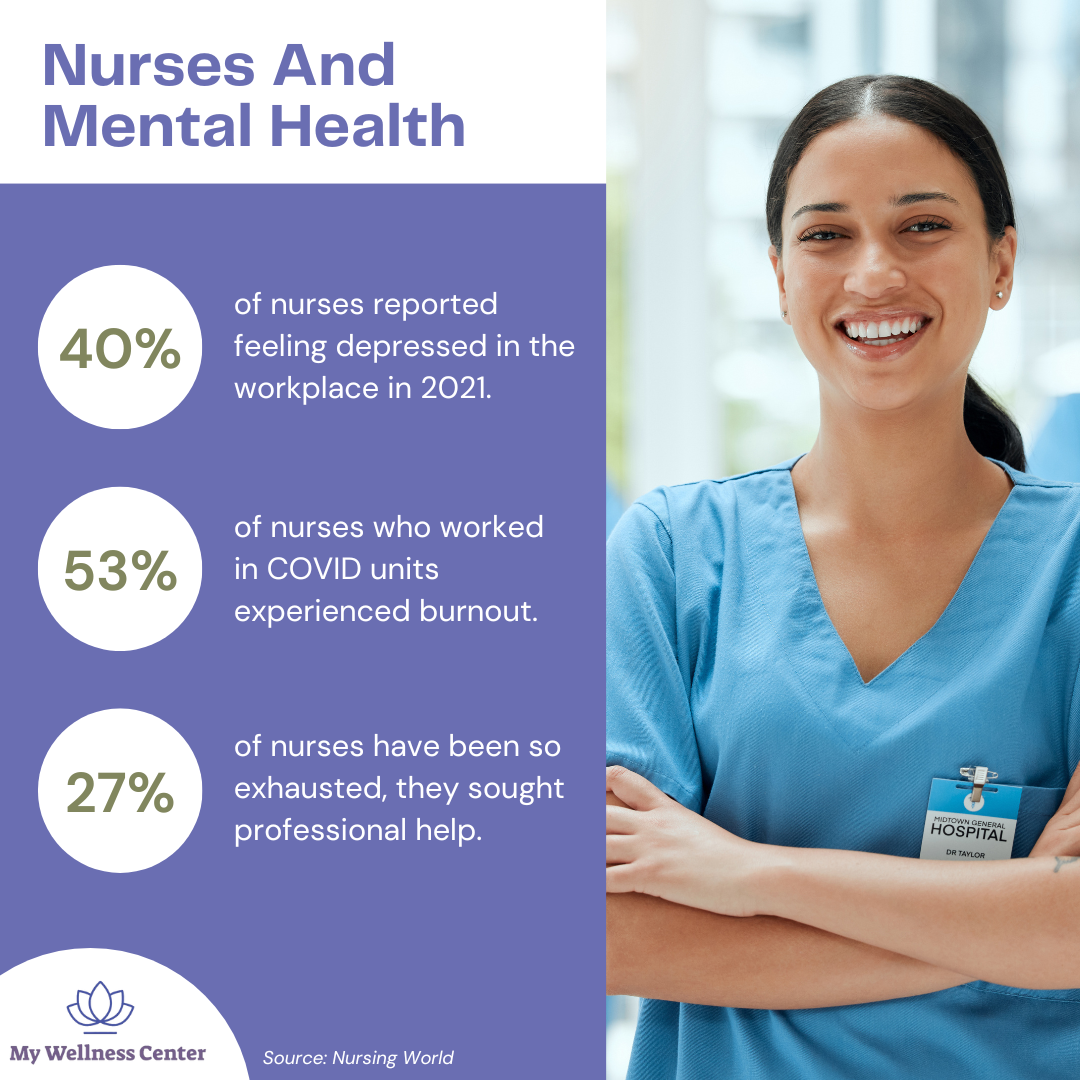Believe it or not, therapy for nurses is critical to the safety of our medical establishments.
We would know. Our roots at My Wellness Center stem from our time at the MAYA Organization, a nonprofit that provides support during pregnancy, birth, and postpartum.
And while we were always focused on the physical, mental, and emotional health outcomes of the mothers, we saw firsthand the stressors of being a nurse.
Being a nurse is hard. Between long hours, high rates of harassment, burnout, and a variety of other issues, many nurses complain of anxiety, depression, and other traumas (similar to first responders).
In fact, according to Nurse Crisis:
- 45% of nurses don’t receive enough emotional support
- 40% of nurses are working through their own health issues
But with the right therapy, nurses can find the support necessary for better performance and mental health at work.
Reasons Nurses Seek Therapy
Here are four of the most common reasons we see nurses in therapy:
1. Vicarious Trauma
Nurses often witness life’s worst moments. ER nurses assist during physical traumas, hospice nurses assist in those painful final minutes, and other nurses are generally called upon most urgently during some sort of crisis.
Nurses are expected to provide compassionate support no matter the situation, but they’re rarely given time to process these events before moving on to the next problem.

2. Nurses Feel Burned Out, Understaffed, and Overworked
In medical facilities throughout the country, nurses are exhausted. Research shows:
- Nearly 40% of nurses reported feeling depressed in 2021. (Source: Nursing World)
- 53.3% of nurses who worked in COVID units experienced burnout. (Source)
- 27% of nurses have felt so exhausted, they’ve sought professional help.
For many nurses, COVID made their jobs unbearable. Approximately 100,000 RNs left the workforce due to stress, burnout, and long hours, and many facilities are still understaffed—which has contributed to even longer hours for those nurses who’ve stayed on.
3. Night Shift
Working the night shift can have a terrible impact on your mental health, and that’s especially true when you’re experiencing the stressors of nursing.
Night shift can be especially difficult for three reasons:
- Working overnight can disrupt your sleeping patterns and may result in less high-quality sleep, which can contribute to mental health issues.
- Working overnight can interfere with how often you see your family, which can be especially difficult for parents. Some parents who work overnight may also sacrifice sleep during the day to care for their family members.
- Working overnight may be physically demanding, which can be further compounded by poor sleep.
A lack of sleep can directly contribute to negative mental health; one study found sleeping six or fewer hours per night makes you 2.5 times more likely to experience frequent mental distress!
4. Abuse And Harassment
Sadly, nurses are more likely to experience harassment than any other profession. According to research from National Nurses United:
- 81.6% have experienced workplace violence in the last year
- 45.5% say they’ve seen an increase in workplace violence in the last year
- 67.8% say they are regularly verbally threatened
- 38.7% say they are regularly physically threatened
Over time, this constant exposure to violence and threats of violence (including sexual assault) can lead to negative mental health outcomes.
Common Therapy Options for Nurses
Some of our most popular and effective treatment methods for nurses are:
1. EMDR
EMDR therapy (Eye Movement Desensitization and Reprocessing Therapy) is a powerful strategy for managing PTSD, anxiety, and stress by helping to process negative events and remove the instinctual responses of fight, flight, or freeze.
Major benefits of EMDR therapy include:
- The ability to resolve trauma in as few as four sessions.
- Reduction of stress felt on a daily basis.
- Comprehensive treatment for PTSD.
2. Acceptance And Commitment Therapy (ACT)
Through ACT, nurses learn to accept their thoughts and emotions, then commit to actions that seek a positive outcome.
After an especially stressful case or a traumatic shift, a nurse could take a healthy, restorative action instead of stepping outside for a cigarette, chugging a sugary soda, or finding another damaging vice.
3. Nightmare Protocol
For nurses who suffer from frequent traumatic dreams, nightmare protocols can help them change the course of nightmares and even stop them from happening altogether.
4. Mindfulness And Meditation
Mindfulness and meditation can be powerful tools for nurses because they grant nurses greater control over their emotions and responses to events inside the workplace.
By acknowledging how they’re feeling throughout the day, nurses can take better steps to manage their emotions and find better ways to calm down (like finding a minute to meditate quietly).
5. Self-Care
Although nurses are tasked with caring for others, long working hours and responsibilities outside of work mean they rarely find an opportunity to care for themselves.
But this self-care is vital for better emotional, mental, and physical health.
Nurses should prioritize self-care throughout the week—in whatever form is most impactful. This could include drawing a bath one night a week, finding time to exercise with a friend, or simply grabbing coffee with a family member.
Find A Pittsburgh Nurse Therapist
If you’re looking for a Pittsburgh therapist who can support nurses and other members of the medical community, contact us. Our team is here to ensure you receive the therapy you deserve for positive emotional and mental health outcomes!

